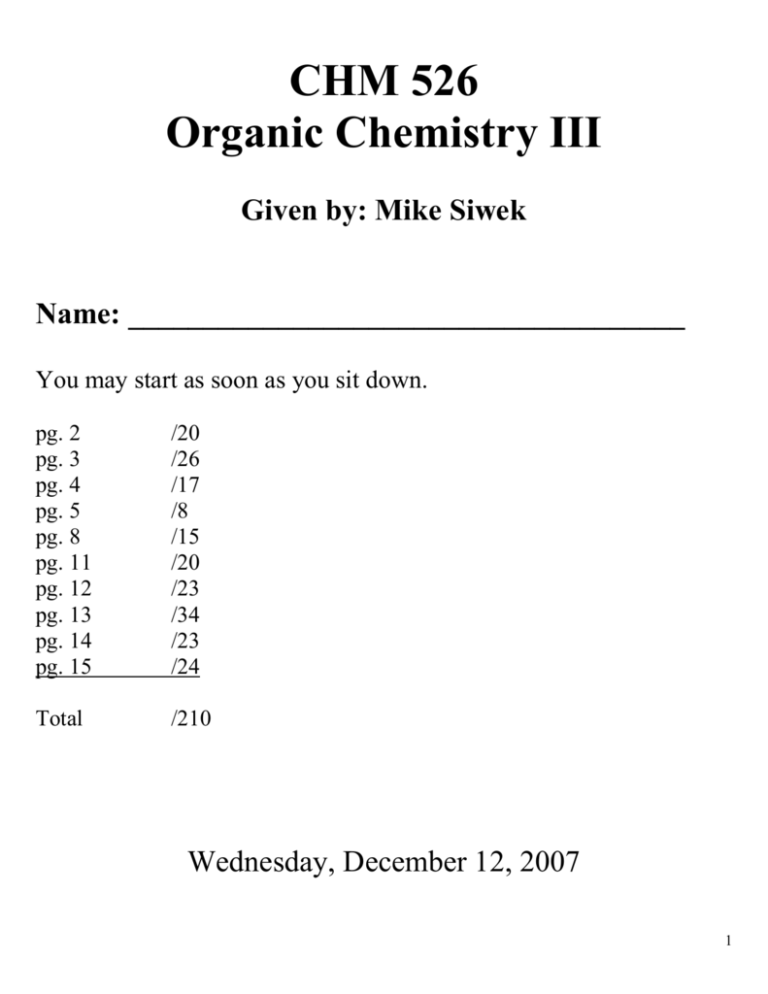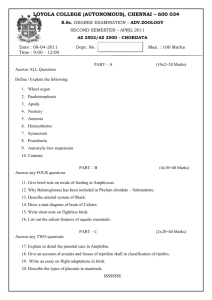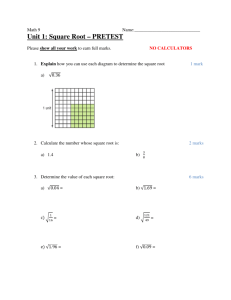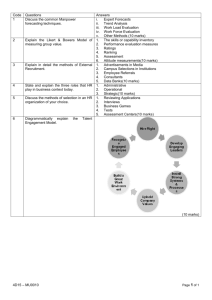
CHM 526
Organic Chemistry III
Given by: Mike Siwek
Name: _____________________________________
You may start as soon as you sit down.
pg. 2
pg. 3
pg. 4
pg. 5
pg. 8
pg. 11
pg. 12
pg. 13
pg. 14
pg. 15
/20
/26
/17
/8
/15
/20
/23
/34
/23
/24
Total
/210
Wednesday, December 12, 2007
1
1. Give the structures of the major products you would expect from the reaction of meta-methylaniline with the
following: (2 marks each)
a. Br2 (1 eq.)
b. methyl iodide (xs)
c. CH3Cl, AlCl3
d. CH3COCl in py
2. How would you prepare aniline from the following starting materials? (3 marks each)
a. benzene
b. benzamide
c. toluene
3. How would you prepare the following substances from 1-butanol? (3 marks each)
a. propene
2
b. dibutylamine
c. propyl amine
4. Fill in the required materials as needed. (2 marks each)
a.
LiAlH4
?
NH2
?
b.
NO2
N
NH2
?
?
H3C
N
H3C
H2SO4/HNO2
?
H3C
c.
O
?
NH2
1. MeI
?
?
NH2
2. Ag2O, heat
OH
d.
O
PCC
?
N
?
NaBH3CN
3
5. Account for the fact that p-nitroaniline (pKa = 1.0) is less basic than m-nitroaniline (pKa = 2.5) by a factor of
30. Draw resonance structures to support your argument. pKa’s refer to the corresponding ammonium ions. (5
marks)
6. Perform at least 3 consecutive steps on the following starting materials and include a reaction from chapter 24.
Do not use the same reaction. (6 marks each)
a. benzene
b.
4
7. Suggest how you could carry out the following transformation. (8 marks)
OH
N
5
8. Use the following spectra to suggest a possible structure(s). Assign the IR and NMR spectra when finished.
The formula for this compound is C4H11N. (15 marks)
COPYRIGHT 1998
Sigma-Aldrich Co.
ALL RIGHTS RESERVED
0.24
0.96
1.04
1.06
2.40
2.62
2.64
2.66
2.68
2.70
2.72
2.74
0.08
0.44
2.5
2.0
1.5
0.09
1.0
COPYRIGHT 1998
Sigma-Aldrich Co.
ALL RIGHTS RESERVED
0.00
50
22.66
100
34.13
150
50.50
76.77
77.19
77.61
200
0
6
7
Write in #8 answer on this page.
8
9. Use the following spectra to suggest a possible structure(s). Assign the IR and NMR spectra when finished. the
formula is C10H12O2. (20 marks)
COPYRIGHT 1998
Sigma-Aldrich Co.
ALL RIGHTS RESERVED
7.0
6.5
6.0
5.5
5.0
4.5
4.0
3.5
3.0
2.5
1.52
1.54
7.5
0.07
2.05
5.84
5.87
5.89
5.91
7.27
7.28
7.30
7.30
7.31
7.33
7.35
0.37
0.23
0.23
2.0
1.5
COPYRIGHT 1998
Sigma-Aldrich Co.
ALL RIGHTS RESERVED
50
0.00
100
21.30
22.18
72.25
76.64
77.06
77.48
150
126.04
127.80
128.45
141.64
170.18
200
0
9
10
Write your answer for #9 on this page.
11
10. Consider 3-methyl-2-pentanone. What three peaks would you most likely see in its mass spectrum? Show
mechanistically how you would account for them. (6 marks)
11. We obtained an HPLC chromatogram for a number of our experiments in the lab this semester. How is HPLC
data most helpful? What does it not tell us? (4 marks)
12. You perform a Hofmann elimination on 1-phenyl-2-aminoethane. What is the product and sketch what you
would expect the TLC to look like under a UV lamp. (5 marks)
13. Fill in the missing materials as required. (2 marks each)
a.
Br
?
Br2
diethyl malonate
?
?
acetic acid
O
O
NaOEt
H3O+
?
12
b.
O
NaOH
?
?
Ph
O
N
H
Ph
1. O3
2. Zn, H+
?
c.
NO2
?
Sn, HCl
?
?
N
O
MgBr
1.
AlCl3
PhCOCl
NaOH
?
?
?
2. H+
d.
NH2
?
NH2
HO
continue stirring
?
Br
?
?
MeI (xs)
Ag2O, heat
?
N
e.
H
O
H+, MeOH
1. NaNH2
?
?
2. 1-iodopropane
H+, H 2O
?
13
f.
?
OH
OH
1. NaN3
SOCl2
?
?
2. H2O, heat
O
g.
O
H+, MeOH
1. LDA
?
?
OH
2. propyl iodide
14. Show the mechanism for the following reaction. (5 marks)
O
O
O
NaOEt
2
MeO
O
15. Suggest how you would carry out the following transformations. (8 marks each)
a.
O
HO
OH
O
OMe
14
b.
N
Ph
c.
O
Br
N
d.
O
O
EtO
O
Ph
15









